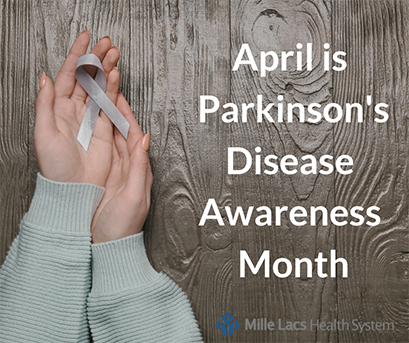Learn the facts of Parkinson’s disease
April 14, 2023
Parkinson's disease is a progressive disorder that affects the nervous system and the parts of the body controlled by the nerves. Parkinson's disease occurs when nerve cells in the brain die. The affected neurons are primarily those that produce the neurotransmitter dopamine. Dopamine is what your nervous system uses to send messages between nerve cells. As dopamine levels decrease, symptoms of Parkinson's start to appear.
Symptoms start slowly. The first symptom may be a barely noticeable tremor in just one hand. Tremors are common, but the disorder may also cause stiffness, slowing of movement, and gait or balance problems. Symptoms often begin on one side of the body and usually remain worse on that side, even after symptoms begin to affect the limbs on both sides. Many people with Parkinson’s disease note that prior to experiencing stiffness and tremor, they had other symptoms such as: sleep problems, constipation, loss of smell, or restless legs.
In the early stages of Parkinson's disease, a person’s face may show little or no expression. Arms may not swing when they walk, and speech may become soft or slurred. Other symptoms that can develop over time include: depression, difficulty swallowing or chewing, urinary problems or constipation, and skin problems. Although Parkinson's disease can't be cured, medications might significantly improve symptoms. Today, nearly one million people live with Parkinson’s disease in the United States, and some 90,000 Americans are diagnosed every year.
There is no single known cause for Parkinson's disease. Genetics is a major factor. Men are more likely to develop the illness than women, and those who are aged 60 and older are at a higher risk. There is also some indication that exposure to environmental toxins like herbicides and pesticides increases the likelihood of Parkinson's disease.
Because the cause of Parkinson's is unknown, there are no proven ways to prevent the disease. Some research has shown that regular aerobic exercise might reduce the risk of Parkinson's disease. Some other research has shown that people who consume caffeine — which is found in coffee, tea, and cola — get Parkinson's disease less often than those who don't drink it. Green tea is also related to a reduced risk of developing Parkinson's disease. However, it is still not known whether caffeine protects against getting Parkinson's or is related in some other way.
If you are concerned about new symptoms of any kind that you or a loved one are experiencing, big or small it’s important to see your medical provider and share any changes physically, mentally, or emotionally. Sometimes a few small changes all added up can be clues to a bigger concern. As always, catching health concerns the sooner the better is always helpful.
